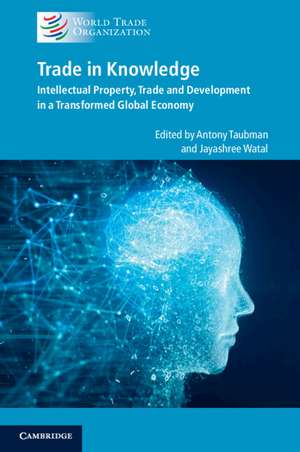Trade in Knowledge: Intellectual Property, Trade and Development in a Transformed Global Economy
Editat de Antony Taubman, Jayashree Watalen Limba Engleză Paperback – 16 mar 2022
| Toate formatele și edițiile | Preț | Express |
|---|---|---|
| Paperback (1) | 336.07 lei 3-5 săpt. | +57.55 lei 6-10 zile |
| Cambridge University Press – 16 mar 2022 | 336.07 lei 3-5 săpt. | +57.55 lei 6-10 zile |
| Hardback (1) | 796.43 lei 6-8 săpt. | |
| Cambridge University Press – 16 mar 2022 | 796.43 lei 6-8 săpt. |
Preț: 336.07 lei
Nou
Puncte Express: 504
Preț estimativ în valută:
64.32€ • 66.44$ • 53.53£
64.32€ • 66.44$ • 53.53£
Carte disponibilă
Livrare economică 05-19 martie
Livrare express 18-22 februarie pentru 67.54 lei
Preluare comenzi: 021 569.72.76
Specificații
ISBN-13: 9781108748476
ISBN-10: 1108748473
Pagini: 866
Dimensiuni: 152 x 228 x 40 mm
Greutate: 1.36 kg
Ediția:Nouă
Editura: Cambridge University Press
Colecția Cambridge University Press
Locul publicării:Cambridge, United Kingdom
ISBN-10: 1108748473
Pagini: 866
Dimensiuni: 152 x 228 x 40 mm
Greutate: 1.36 kg
Ediția:Nouă
Editura: Cambridge University Press
Colecția Cambridge University Press
Locul publicării:Cambridge, United Kingdom
Cuprins
1. Thematic overview: Charting the evolution of knowledge flows Antony Taubman and Jayashree Watal; Part I. Conceptual framework: 2. The shifting contours of trade in knowledge: the new 'trade-related aspects' of intellectual Property Antony Taubman; 3. How digitization is transforming trade Lee Tuthill, Antonia Carzaniga and Martin Roy; 4. Intellectual property and digital trade -mapping international regulatory responses to emerging issues Wolf R. Meier-Ewert and Jorge Gutierrez; Part II. Measuring trade in knowledge: 5. Measuring international intellectual property transactions in a globalized world: current challenges and possible improvements Joscelyn Magdeleine and Andreas Maurer; 6. A missing link in the analysis of global value chains: Cross-border flows of intangible assets, taxation and related measurement implications Thomas Neubig and Sacha Wunsch-Vincent; 7. Global ebbs and flows of patent knowledge Andrew W. Torrance, Jevin D. West, and Lisa C. Friedman; 8. Sources of knowledge flow between developed and developing countries Laurie Ciaramella, Gaétan De Rassenfosse and Florian Seliger; 9. Using intellectual property data to measure cross-border knowledge flows Jacob Dubbert, Alexander V. Giczy, Nicholas Pairolero and Andrew A. Toole; 10. The Global Digital Content Landscape Erick Oh; 11. Cross-border knowledge flows through R&D FDI: Implications for LMMICs Vito Amendolagine, Cristina Chaminade, José Guimón and Roberta Rabellotti; 12. The innovation environment and knowledge diffusion: improving policy decisions through patent analytics Holger Ernst, Carsten C. Guderian and Marco Richter; Part III. Impact of knowledge flows on trade and development: 13. Global knowledge flows, absorptive capacity, and capability acquisition: old ideas, recent evidence, and new approaches Lee Branstetter and Keith E. Maskus; 14. Trade in intellectual property-intensive goods Mercedes Delgado and Margaret Kyle; 15. Knowledge spillovers through international supply chains Roberta Piermartini and Stela Rubínová; 16. How do patents shape global value chains? International and domestic patenting and value-added Trade Nikolas J. Zolas and Travis J. Lybbert; 17. The enforcement of intellectual property rights in a digital Era Michael D. Smith and Rahul Telang; 18. The digital creative economy and blockchains: options and prospects for the developing world Keith Nurse, Erica Smith, Kayla Grant and Alicia Shepherd; Part IV. Policy, regulatory and legislative frameworks; 19. Streaming of music and audiovisual works Mary Lafrance; 20. Adapting trade rules for the age of big data Mira Burri; 21. Trade in knowledge and cross-border data flows: a look at emerging digital regulatory issues Nigel Cory; 22. Cross-border knowledge flows under international trade agreements: a need for new multilateral disciplines? Lucas Spadano and Luiza Tângari Coelho; 23. The need for a global framework for knowledge transactions: cross border licensing and enforcement Jacques de Werra and Jeff C. Dodd; 24. Fitting machine-generated data into trade regulatory holes Peter K. Yu; 25. Looking forward Antony Taubman.
Notă biografică
The General Agreement on Tariffs and Trade (GATT) was created in 1947 and operated almost five decades on a provisional basis until 1995 when the WTO was established. Its goal is to improve the welfare of peoples of its member countries, specifically by lowering trade barriers and providing a platform for the negotiation of trade. The organization deals with the rules of trade between nations at a global or near global level; it is responsible for negotiating and implementing new trade agreements and charged with policing Member Countries' adherence to all WTO agreements. In 2007 there were 150 Member States.
Descriere
Offers insights into what it means to trade in knowledge in today's technological and commercial environment.
